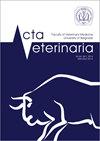放牧马胃肠道蠕虫的季节性和动态
IF 0.7
4区 农林科学
Q3 VETERINARY SCIENCES
引用次数: 0
摘要
摘要马体内蠕虫的患病率可能因气候因素和宿主易感性而异。本研究的目的是评估2015年10月至2016年9月期间放牧马蠕虫感染的季节动态。总共有104匹不同年龄组的杂交马参与了这项研究,雄性和雌性都在一个牛群中。每28天采集一次单独的粪便样本,用于每克粪便中鸡蛋的计数(EPG)和粪便培养物。分别对马的体重、身体状况评分(BCS)和临床状况进行评估。还收集了与农场有关的气候信息。受蠕虫影响最大的类别是小马驹和高级马,EPG平均值分别为1271.9和1186.5。四个季节所有动物类别的EPG平均值为:春季1042.1;1508.9夏季;817.8秋季;和571.1冬季。通过身体状况评估,可以看出,老年动物在所有季节中表现出最低的BCS。得出的结论是,这些动物受蠕虫感染影响最大的季节是夏天,最易感染的类别是小马驹和老马。本文章由计算机程序翻译,如有差异,请以英文原文为准。
Seasonality and Dynamics of Gastrointestinal Helminths in Grazing Horses
Abstract The prevalence of helminths in horses may vary, depending on climatic factors and host susceptibility. The objective of this study was to evaluate the seasonal dynamics of helminth infection in grazing horses, from October 2015 to September 2016. In total, 104 crossbred horses of different age groups, males and females in a single herd, participated in this study. Individual fecal samples were collected every 28 days for counting of eggs per gram of feces (EPG) and fecal cultures. The horses were evaluated individually for weight, body condition score (BCS) and clinical status. Climatic information relating to the farm was also collected. The categories most affected by helminths were foals and senior horses, with EPG averages of 1271.9 and 1186.5, respectively. The EPG averages for all animal categories together, in the four seasons were: 1042.1 spring; 1508.9 summer; 817.8 autumn; and 571.1 winter. Through the body condition evaluation, it was seen that senior animals presented the lowest BCS in all seasons. It was concluded that the season in which these animals were most affected by helminth infections was the summer and that the most susceptible categories were foals and senior horses.
求助全文
通过发布文献求助,成功后即可免费获取论文全文。
去求助
来源期刊

Acta Veterinaria-Beograd
农林科学-兽医学
CiteScore
1.30
自引率
16.70%
发文量
33
审稿时长
18-36 weeks
期刊介绍:
The Acta Veterinaria is an open access, peer-reviewed scientific journal of the Faculty of Veterinary Medicine, University of Belgrade, Serbia, dedicated to the publication of original research articles, invited review articles, and to limited extent methodology articles and case reports. The journal considers articles on all aspects of veterinary science and medicine, including the diagnosis, prevention and treatment of medical conditions of domestic, companion, farm and wild animals, as well as the biomedical processes that underlie their health.
 求助内容:
求助内容: 应助结果提醒方式:
应助结果提醒方式:


